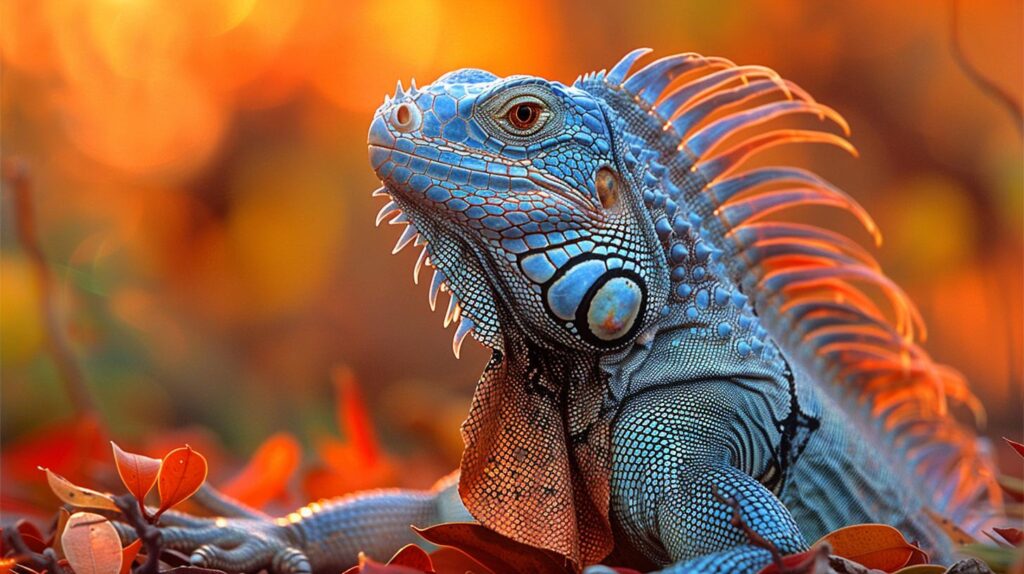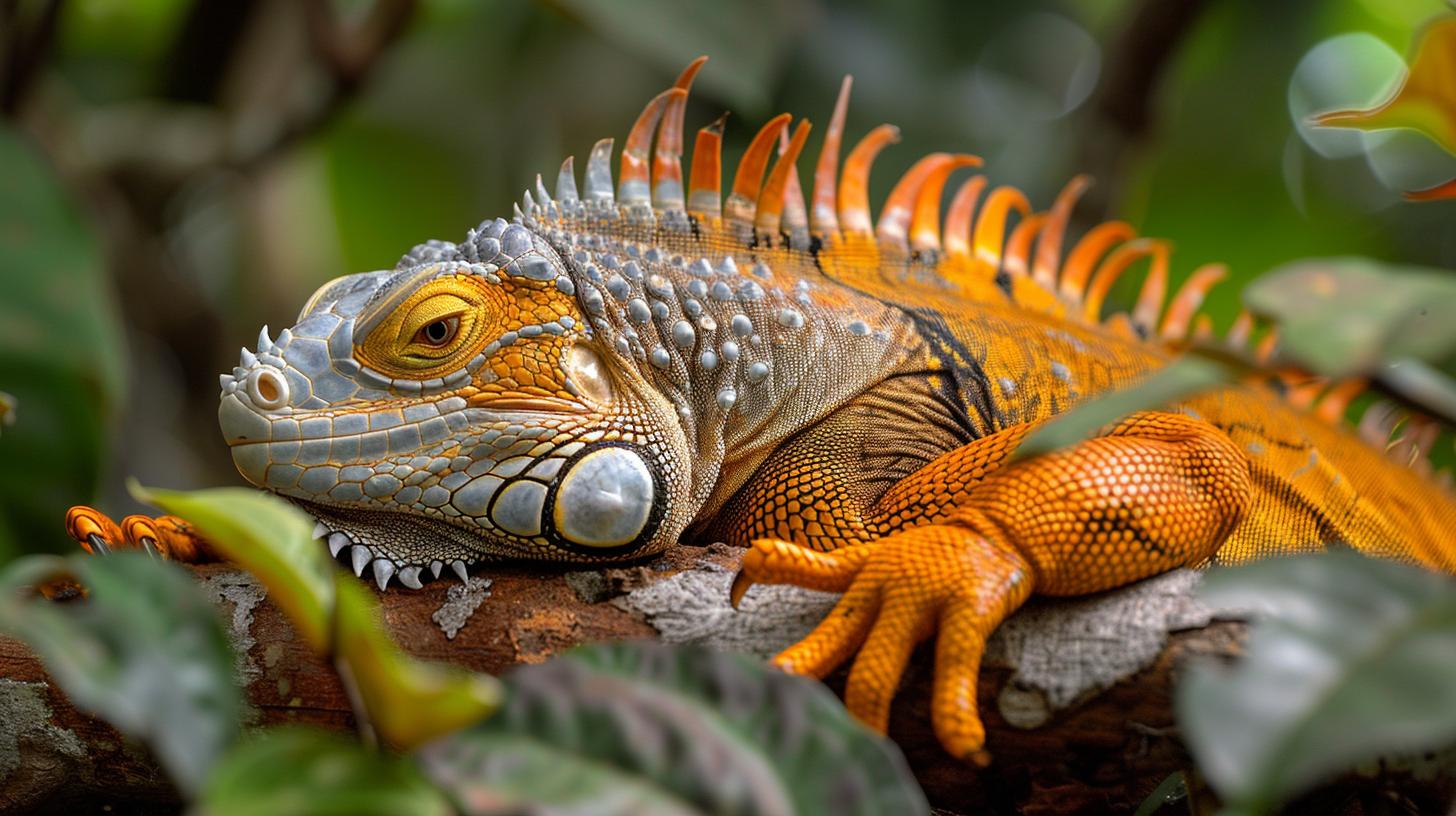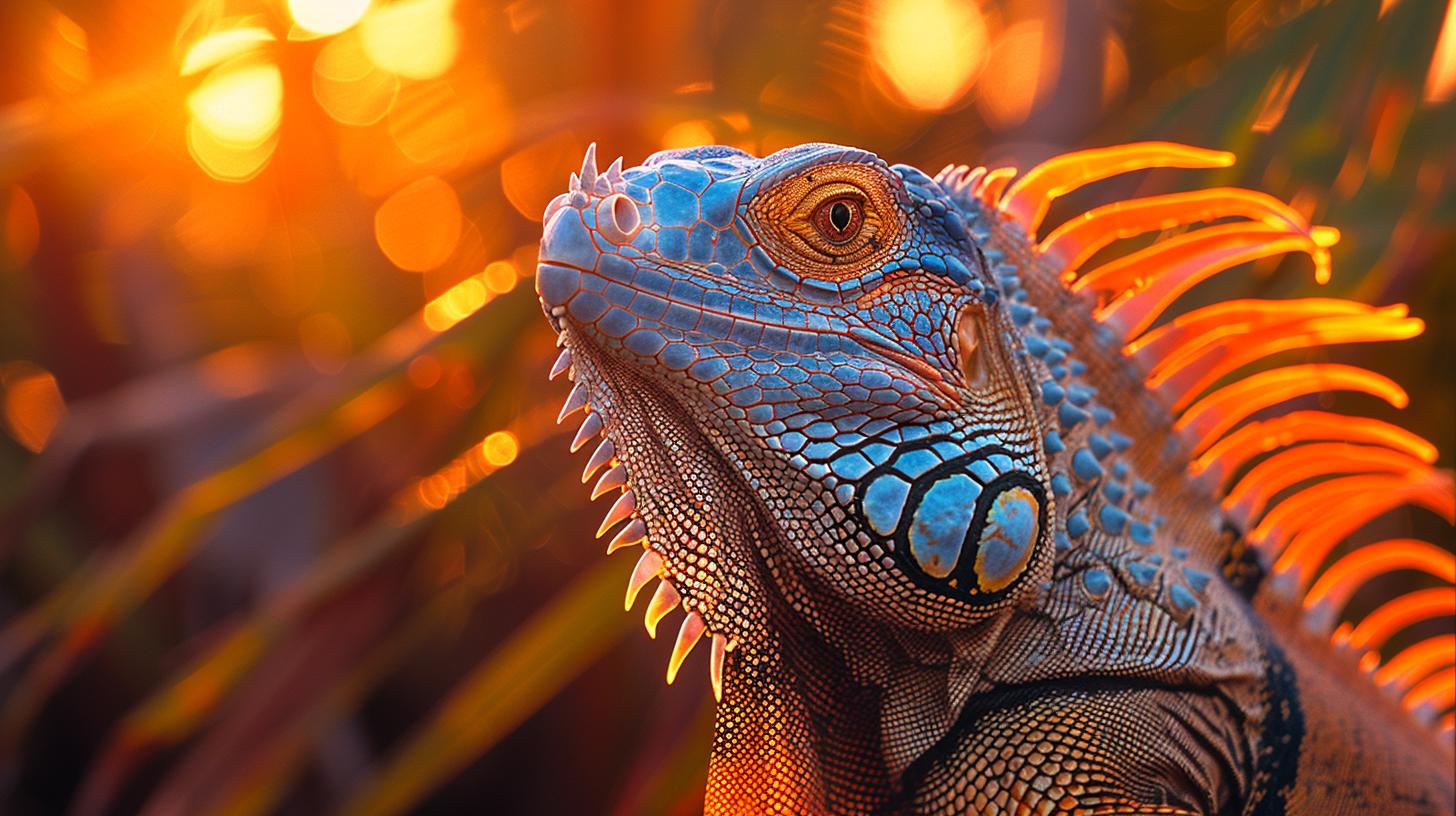Best Fruits and Vegetables for Iguana Health

- Understanding the Dietary Needs of Iguanas
- The Role of Fruits in Iguana Health
- Must-Have Fruits for Your Iguana
- The Importance of Vegetables in an Iguana's Diet
- Top Vegetable Picks for Iguanas
- Foods to Avoid
- Practical Tips for Incorporating Fruits and Vegetables Into Your Iguana's Diet
- Frequently Asked Questions
Understanding the Dietary Needs of Iguanas
For many iguana owners, ensuring the pinnacle of iguana health begins with a comprehensive understanding of their dietary requirements. Iguanas, with their vibrant colors and unique personalities, are not just mere pets; they are a commitment to understanding and catering to complex nutritional needs.
This segment sheds light on the fundamental aspects of iguana nutrition, focusing on striking the right balance in their diet to promote optimal health. The journey into the world of iguana care is a fascinating one, filled with learning curves that emphasize the importance of precision and care in their feeding habits.
At the heart of an iguana's dietary needs lies a delicate balance between various food groups, each serving its purpose in maintaining health and vitality. Unlike the common perception of these reptiles thriving solely on a diet of insects or commercial pellets, iguanas require a rich tapestry of fruits and vegetables to mimic the nutrient intake they would naturally receive in the wild.
This basis in variety not only ensures that iguanas get essential vitamins and minerals but also introduces them to hydration sources critical for their overall well-being.
Moreover, while fruits play an integral role in hydrating and supplying necessary vitamins to an iguana's diet, it's vital to approach their inclusion with moderation due to potential high sugar content. Transitioning smoothly into vegetable consumption emphasizes the provision of fiber and essential minerals vital for digestive health and physiological functions.
Understanding these nutritional nuances sets the stage for exploring specific fruits and vegetables that align perfectly with an iguana's dietary requirements, carving the path toward nurturing contented, healthy reptilian companions.
The Role of Fruits in Iguana Health
The inclusion of fruits in an iguana's diet serves not only as a source of essential vitamins and minerals but also plays a significant role in promoting optimal hydration levels. Iguanas, much like other reptiles, exhibit unique dietary preferences and health requirements that necessitate a careful balance - particularly when incorporating sweeter foods such as fruits.
These delectable treats are rich in water content, making them an excellent source for keeping your scaled companion adequately hydrated, especially in environments where humidity can fluctuate significantly. However, the sugar content found in fruits means they must be offered judiciously to avoid potential health detractors such as obesity and dental issues.
Hydration Through Fruits
Fruits not only tantalize your iguanas' taste buds but also contribute immensely to their overall well-being by ensuring they receive enough liquids through their diet. In conditions where iguanas might be reluctant to drink sufficient water or have limited access to fresh sources, incorporating juicy fruits like watermelons or cantaloupes can significantly boost their hydration levels. This aspect of iguana health underlines the duality of fruit benefits - offering both nutritional value and aiding in the essential process of hydration.
Vitamins and Minerals Galore
Beyond hydration, fruits are indispensable for supplementing iguanas with a myriad of vitamins (A, C, and E) and minerals crucial for maintaining robust iguana health These nutrients support everything from sight to immune system functionality, to the healthy development of skin - a crucial element given the shedding process iguanas regularly undergo.
Mangoes, papayas, and berries can be especially beneficial for their high vitamin content which supports these vital biological functions. Yet it's imperative that fruit offerings are balanced within the diet to prevent overexposure to sugars that come along with these nutritional perks.
The Balancing Act: Moderation Is Key
Acknowledging the appeal fruits hold for many iguanas - thanks largely to their sweetness - it becomes essential for pet owners to moderate consumption. While fruits offer undeniable benefits promoting active iguana health, there lies a risk in overlooking potential drawbacks stemming from excessive sugar intake; this includes weight gain or dental challenges which could overshadow the positives if not carefully managed.
By integrating a variety of fruits into an iguana's diet modestly - treating them more as supplements rather than staples - caregivers can navigate towards ensuring their reptilian companions enjoy both flavorful meals and hearty wellness.
Must-Have Fruits for Your Iguana
When considering the best fruits to incorporate into your iguana's diet, it is essential to focus on those that offer high nutritional value and are safe for their system. Iguanas thrive on a variety of fruits which can significantly contribute to their overall iguana health and wellbeing. In this section, we'll outline several fruits that not only serve as delicious treats but also provide vital nutrients necessary for your pet's optimal health.
Firstly, figs stand out as an excellent choice due to their calcium content, which is crucial for preventing metabolic bone disease in iguanas. This condition is common among captive iguanas and can be mitigated by ensuring calcium-rich foods are part of their diet.
Additionally, mangoes offer a sweet treat that's packed with vitamins A and C, promoting healthy skin and immune function. However, like all good things, these should be offered in moderation to prevent issues related to excessive sugar intake.
- Figs: High in *calcium*, supports bone health.
- Mangoes: Rich in *vitamins A and C*, promotes skin and immune health.
- Berries (strawberries, blueberries): Full of *antioxidants*, beneficial for overall vitality.
Including berries such as strawberries and blueberries in your iguana's fruit mix can also promote excellent health thanks to their antioxidant properties. These not only help in fighting off infections but also contribute to the overall vitality of your iguana. Remember, the key lies in diversity; providing a mix of these fruits can ensure your iguana receives a balanced spectrum of nutrients.
While integrating these must-have fruits into your iguana's diet is vital for maintaining robust iguana health, it equally emphasizes understanding the portion sizes appropriate for them. Overfeeding fruits can lead to weight gain and other health implications due to the natural sugars they contain. It's about striking a balance between fulfilling their dietary needs without going overboard.

Hence, incorporating figs, mangoes, and various berries into your reptile friend's diet contributes immensely towards achieving optimal iguana health. By mixing these different options periodically you'll not only avoid feeding monotony but also foster nutritional balance which is critical in keeping your pet vibrant and thriving.
The Importance of Vegetables in an Iguana's Diet
Understanding the Nutritional Impact of Vegetables
Vegetables play a critical role in ensuring optimal iguana health, serving as a cornerstone for their diet. Unlike other pets that might thrive on a more omnivorous or carnivorous diet, iguanas are primarily herbivores. This means their consumption of vegetables is vital not just for survival but for flourishing.
Vegetables offer an array of essential nutrients, including vitamins, minerals, and fiber crucial for maintaining a healthy digestive system in iguanas. As owners look to nurture their iguanas' well-being, understanding the comprehensive benefits that vegetables provide beyond basic sustenance is essential. This includes recognizing how different vegetables contribute to the overall nutritional balance, impacting everything from bone health due to calcium intake to the functionality of internal organs through adequate fiber.
Fiber: The Underrated Hero
One cannot overstate the importance of fiber in an iguana's diet, primarily sourced from vegetables. Fiber aids in efficient digestion by helping to keep an iguana's digestive tract moving and preventing common issues such as constipation and impaction-a frequent concern among reptile owners. Furthermore, a diet rich in high-fiber vegetables is instrumental in mimicking the natural feeding patterns and nutritional intake iguanas would encounter in the wild.
This alignment with their natural eating habits promotes not only physical health but mental well-being too, as they engage with food varieties that trigger instinctual behaviors. Owners aiming to cater to their pets' dietary needs might find themselves focusing on leafy greens which tend to be high in both nutrients and fiber content.
Vital Minerals for Health and Growth
Vegetables aren't just about ensuring a smooth digestion process; they are also indispensable sources of minerals such as calcium and phosphorus-key players in supporting strong bone development and prevention of metabolic bone disease, a common ailment in captive iguanas. Balancing calcium-rich foods with appropriate vitamin D absorption is paramount, given that sunlight exposure alone often isn't enough to maintain optimal iguana health.
Kale, collard greens, and butternut squash feature prominently among the best options offering these vital elements without introducing risks associated with overconsumption of certain compounds found in other less suitable vegetable choices. Hence, selecting the right mix of vegetables becomes an exercise in safeguarding against nutritional imbalances while promoting vibrant health and longevity among these unique pets.
By integrating this nuanced understanding of how vegetables support various facets of an iguana's well-being into care routines, owners can significantly enhance their reptiles' quality of life ensuring they lead full, active lives characterized by robust health.
Top Vegetable Picks for Iguanas
When considering vegetables for iguana health, it's essential to prioritize those packed with nutrition, low in oxalates, and high in fiber. Green leafy vegetables often stand out due to their nutrient density and are generally beloved by iguanas. However, variety is key to preventing nutritional deficiencies and ensuring your pet receives all necessary vitamins and minerals.
Among the top picks, *kale* and *collard greens* provide an excellent source of calcium, which is vital for bone development and overall health. These should be staples in any iguana's diet due to their beneficial nutritional profile. Here's a list of essential vegetables that could greatly contribute to improved iguana health:
- Kale: High in calcium and vitamin A.
- Collard Greens: Rich in vitamins A, C, and calcium.
- Squash: Offers vitamin C and Beta-Carotene.
- Butternut squash: A good source of vitamins E and B6.
- Dandelion leaves: Nutrient-rich; a great source of calcium.
Incorporating these vegetables into your iguana's diet can significantly impact their health positively. It is advisable to wash all produce thoroughly to remove potential pesticides which could harm your iguana. Offering a mixture of these vegetables not only ensures that your iguana gets a balanced diet but also keeps them interested in their food. Variation aids in maintaining an optimal level of engagement with meals, encouraging regular consumption which is necessary for staying hydrated and healthy.
Beyond incorporating the aforementioned vegetables, understanding each vegetable's specific role in an iguana's dietary regime can empower owners to make informed decisions about daily meal preparations. For instance, whereas kale might be lauded for its calcium content beneficial for bone strength, dandelion leaves are invaluable for providing a diverse set of nutrients pivotal for skin health - demonstrating the broader spectrum of care provided through carefully selected diets.
While the focus on green leafy vegetables is paramount, acknowledging the benefits of occasional servings of other vegetables like squash enriches an iguana's diet with additional vitamins crucial for eye health among other physiological benefits. This variety not only caters to the comprehensive nutritional needs but also stimulates iguanas' appetite through different flavors and textures thus promoting overall well-being.

Remembering that each vegetable brings its unique set of benefits encourages diversity in meal planning, thereby ensuring that your iguana enjoys both a delicious and nutritionally complete diet tailored toward sustaining robust iguana health. This approach underscores the importance of being mindful about dietary choices while fostering a nourishing environment conducive to your pet's thriving life.
Foods to Avoid
When considering a well-rounded diet for your iguana, it's just as important to know which foods to exclude as it is to understand the nutritious fruits and vegetables that promote *iguana health*. Not all foods are created equal in terms of nutritional value, and some can pose significant health risks to your reptilian pet.
This segment will pinpoint specific items that should never find their way into your iguana's feeding schedule, providing you with the knowledge needed to sidestep potential dietary pitfalls.
One major item to avoid is spinach. Despite being lauded for its high vitamin content in human diets, spinach can be detrimental for iguanas due to its high oxalate levels. Oxalates can bind with calcium in the body, forming compounds that the iguana cannot absorb. This can lead to calcium deficiencies, a serious concern given that *calcium is essential* for bone health and overall vigor in iguanas.
Another vegetable that often gets mistaken for a good diet choice is iceberg lettuce. It's crucial to recognize that while iceberg lettuce is not harmful per se, it offers minimal nutritional value and consists mainly of water. Feeding your iguana iceberg lettuce could fill them up without providing the necessary vitamins and minerals they need, leading potentially to malnourishment.
Fruits generally play a beneficial role in an *iguana's diet*, but it's key to use them sparingly due to their sugar content. For instance, grapes and bananas are favorites among many iguanas; however, their high sugar levels can lead to obesity and other health issues if consumed in excess. Moderation is vital when incorporating these sweet treats into your pet's meal plan.
| Food Item | Reasons to Avoid |
|---|---|
| Spinach | High oxalate content binds with calcium. |
| Iceberg Lettuce | Lacks nutritional value; mostly water. |
| Grapes/Bananas | High sugar content; risk of obesity. |
By educating yourself on the appropriate diet for your pet iguana including both what to include and what foods should be avoided at all costs, you lay down the foundation for their long-term health and happiness. Monitoring and adjusting your iguana's diet according to these guidelines ensures they get just what they need without any unnecessary risks or ingredients that would detract from their wellbeing.
As this section continues, we will delve into more practical tips on how best to integrate these dietary principles into everyday care practices for your beloved reptile companion.
Practical Tips for Incorporating Fruits and Vegetables Into Your Iguana's Diet
In wrapping up our engaging journey through the essential nutrition and ideal dietary practices for maintaining optimal iguana health, it becomes clear that understanding and implementing a varied diet rich in specific fruits and vegetables is key. It's not just about offering your iguana any fruit or vegetable but selecting those packed with the nutrients vital for their wellbeing.
The delicate balance between providing enough vitamins from fruits without overdoing the sugar, alongside ensuring a steady intake of fiber-rich vegetables, underscores the art and science of iguana feed. Reflecting on this balanced approach to diet highlights our enduring commitment to equipping iguana owners with knowledge that transcends basic care, aiming for thriving, vibrant pets.
Navigating through the myriad choices of fruits and vegetables suitable for your reptilian companion might have seemed overwhelming at first glance. However, equipped with precise insights into must-have fruits and top vegetable picks tailored for an iguana's unique physiological needs, empowered pet owners can now confidently curate meals that promise not only sustenance but also a boon to their pet's health.
This holistic overview extends beyond mere feeding tips; it serves as a foundation for fostering a nurturing environment where your iguana can enjoy longevity and quality of life.
We hope this exploration into the best dietary practices for your iguana has illuminated the path toward more enriched caretaking. Through careful consideration of each bite your iguana takes, you're ensuring a future filled with vibrancy and vigor.
Should curiosity or concern about your pet's nutritional needs further bloom, we invite you to continue your quest for knowledge within our extensive library of articles dedicated to pet health and wellness. Whether you seek to deepen your understanding or tackle another challenge in pet care, our repository offers insightful resources designed to support you every step of the way in your pet caretaking journey.
Frequently Asked Questions
How Do I Keep My Iguana Healthy?
Keeping your iguana healthy involves providing a balanced diet, ensuring they have access to adequate UV light, and maintaining the right humidity and temperature conditions in their habitat. Regular veterinary check-ups are also vital for early detection of potential health issues. For their diet, include a variety of leafy greens and vegetables to prevent nutritional deficiencies.
How Do You Know if Your Iguana Is Healthy?
A healthy iguana will exhibit vibrant skin color, clear eyes, and be active and alert. Their appetite should be consistent, and their movements smooth without any signs of discomfort or limping. Regularly check for signs such as mucus around the nose or mouth, wheezing sounds while breathing, or sudden changes in weight, as these might indicate health problems.
What Is the Average Lifespan of an Iguana?
The average lifespan of an iguana can range from 10 to 20 years when cared for properly in captivity. Factors that contribute to a long life include a nutritious diet, proper habitat conditions, and regular veterinary care to monitor for common health issues that might arise throughout their life.
Do Iguanas Carry Any Diseases?
Yes, iguanas can carry diseases communicable to humans, such as Salmonella bacteria. This bacteria is usually transmitted through direct or indirect contact with the animal's feces. Always practice good hygiene by washing your hands thoroughly with soap and water after handling your iguana or any objects in their environment to minimize the risk of transmission.
Leave a Reply
You must be logged in to post a comment.